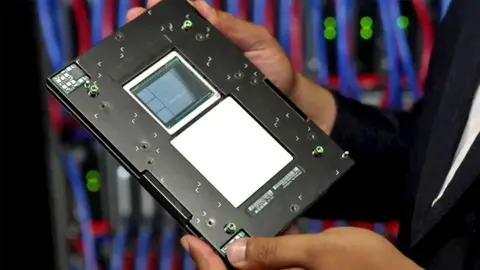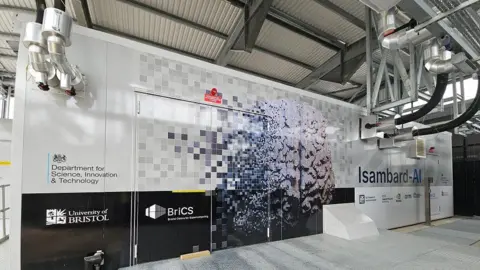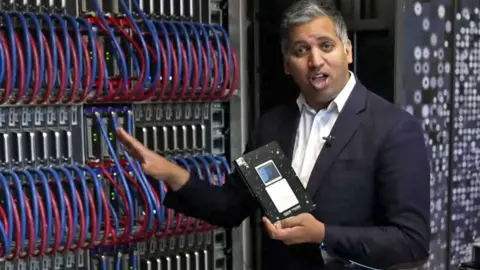UK's most powerful supercomputer comes online
 BBC
BBCA supercomputer that is the most powerful in the UK has been made fully operational in Bristol.
Technology Secretary Peter Kyle "flicked the switch" on the Isambard-AI machine as the government unveiled fresh artificial intelligence plans.
The computer will become part of the UK's public AI computing capacity along with a machine in Cambridge called Dawn.
The aim is to use the supercomputer for public projects such as bringing down NHS waiting lists and developing new tools to tackle climate change - although AI is notoriously energy-hungry.
In addition, the government announced that Scotland and Wales will be in line for billions of investment in so-called AI Growth Zones.
Part of the Isambard-AI computer was being used in January for a medical project to develop vaccines, but it has now been turned on entirely.
As the name suggests, a supercomputer has more processing power and can complete more tasks more quickly than a less powerful computer.
It processes data in the same binary format as regular computers but uses thousands more processing units to analyse more data at faster speeds.
 University of Bristol
University of Bristol'Huge advances'
Along with Dawn, the supercomputers will form the UK's "AI Research Resource" and will be available for public projects, although they won't combine computing power.
This resource, which may in future include other supercomputers, will be expanded 20-fold over the next five years, the government said.
Speaking to BBC economics editor Faisal Islam, Kyle said AI would enable "huge, unimaginable advances in the cure of disease".
"But it's also going to change the workplace. In order to benefit from that, you have to be prepared."
The government is preparing and training a million students in AI, and 7.5 million people will be trained in the broad economy in the coming months and years.
Kyle said he understood that people may be "anxious about the future" in terms of how AI would affect their jobs, but the UK was "already seeing huge improvements in productivity" due to the technology.
"AI is going to happen to Britain," he said. "What we can do, and what we have a choice over, is how it happens in Britain."

Isambard-AI uses more than 5,400 Nvidia GH200 Grace Hopper Superchips, with Hewlett-Packard technology, while Dawn, at the University of Cambridge, uses more than 1,000 Intel chips, along with Dell technology.
The supercomputer was built by the University of Bristol, but paid for using public money.
David Hogan, Nvidia's European vice president, said Isambard-AI was a "truly transformational machine" but that it was "just a starting point".
To support the government's plans, researchers, academics and tech bosses have been brought together to develop an AI strategy to be published in the autumn.
The group includes Google DeepMind vice president Pushmeet Kohli, vice president of the Royal Society, Alison Noble, and chairwoman of the Engineering and Physical Sciences Research Council, Charlotte Deane.
The UK government has claimed that more investment in and scaling up of British supercomputers will help it fulfil its plans for growth and "position the country as an AI maker rather than an AI taker".
Companies around the world are currently vying to acquire the best talent and hardware in the sector to try and cement their dominance in it.
The Bristol supercomputer recently ranked 11th in the latest list of the world's top 500 most powerful, commercially available computers.
Additional reporting by Liv McMahon
